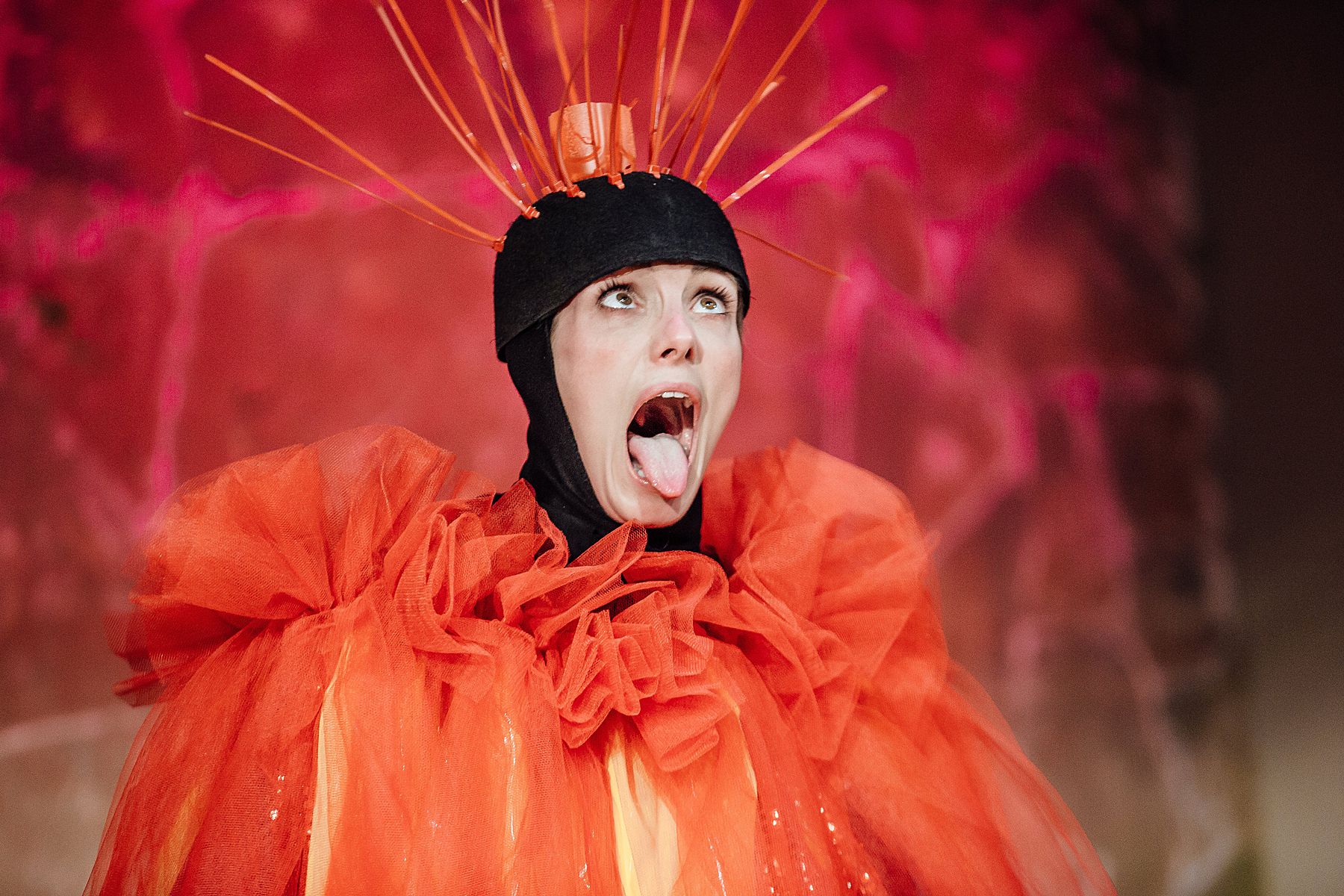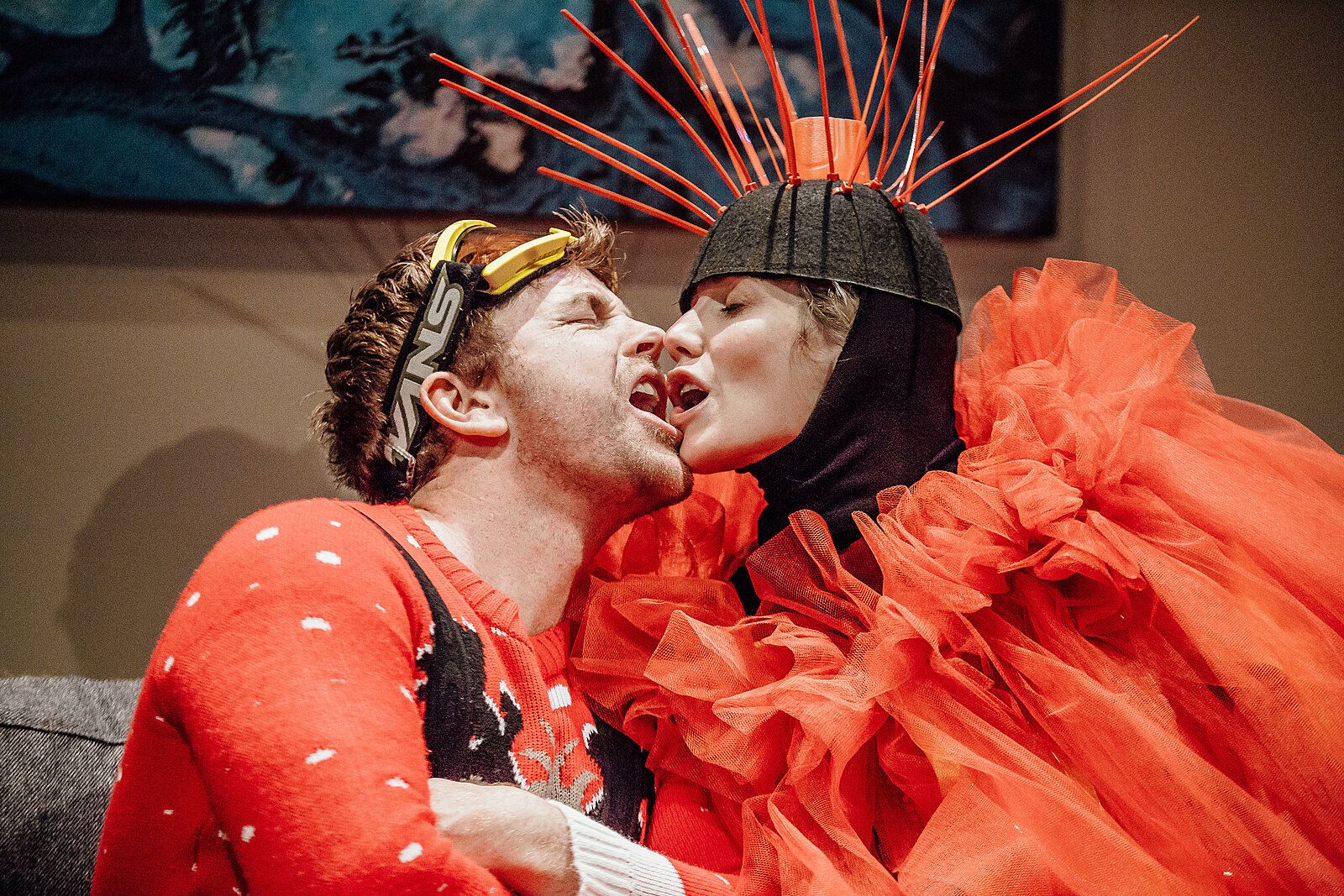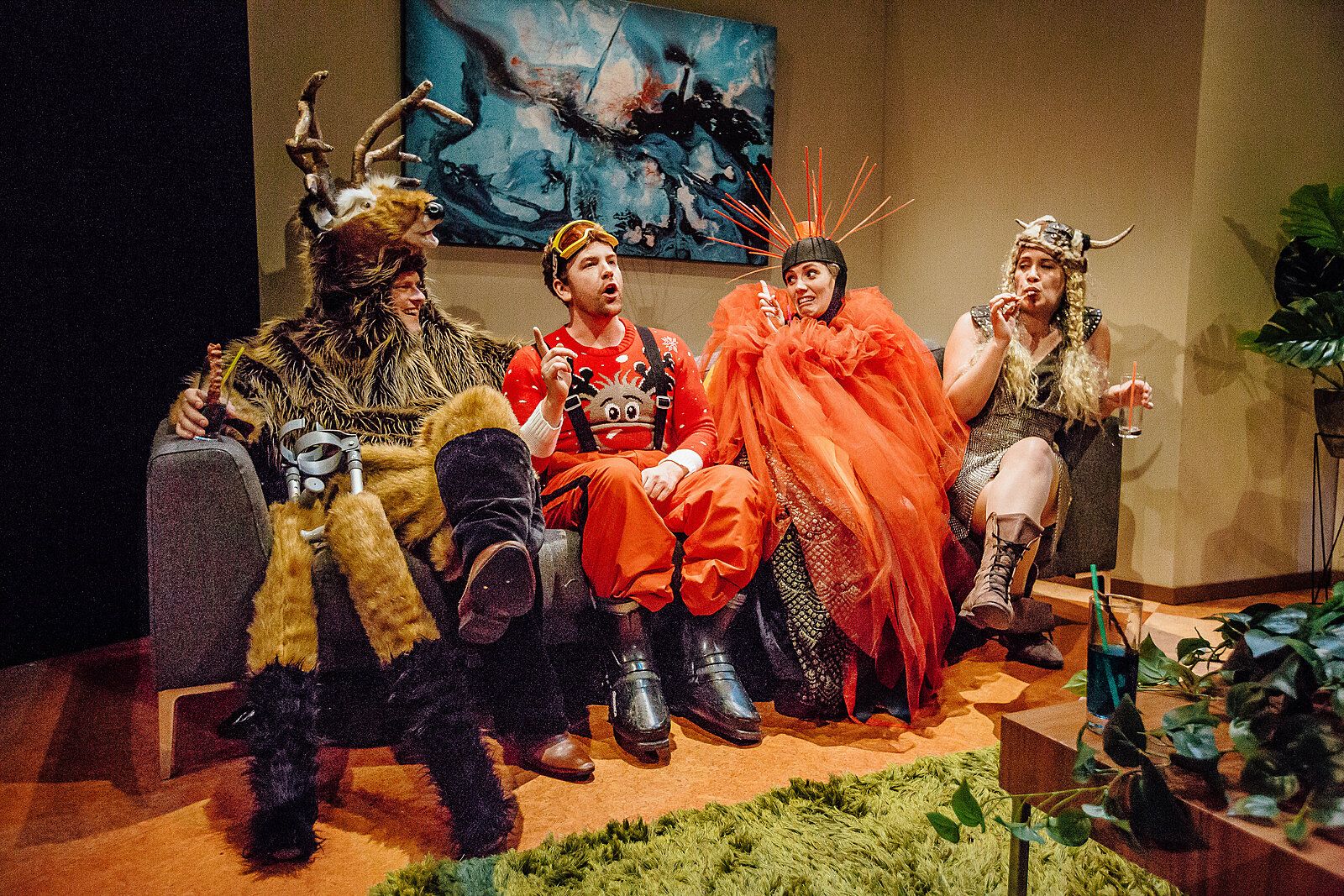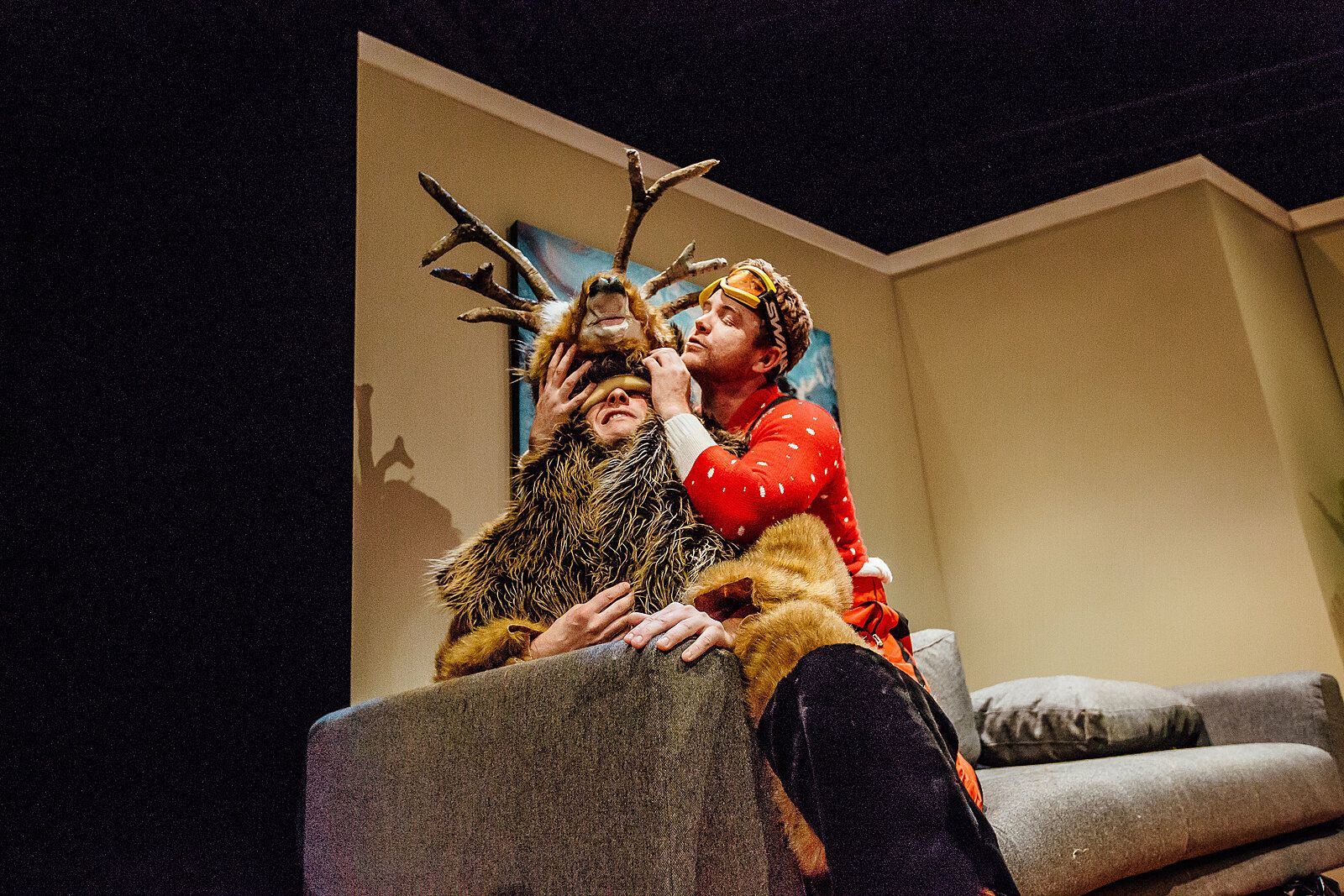What’s to become of us now that the apricots have run out?
Sam Brooks on how a German absurdist comedy unravels our unstable relationship to change, and reveals more about the New Zealand psyche than we realise.
We are at the mercy of change. It’s inevitable. It might be a change in our surroundings – small shifts that accumulate until the home we’re living in no longer feels like home. It might be a change in other people, where somebody unexpectedly reveals themselves to be another thing entirely. Sometimes it’s for the better. Sometimes it’s not. The one constant is that there isn’t any.
Marius von Mayenburg’s Perplex makes change a very literal experience, and it does so in terrifying and hilarious ways. A couple comes home from their vacation to find their plants haven’t been watered, their lights don’t work, and the people they thought were looking after their house has actually moved in. Roles are switched, situations slide into one another, and the fourth wall is leaned upon, cracked, and redrawn.
In Perplex, everything changes, and nobody is safe.
*It’s true: Perplex is as meta a theatrical experience you’ll find. It’s reality-bendingly, meta: the actors’ names become the characters’ names. The characters are constantly, often tiredly, referencing the fact they’re in a play. In one scene, Natalie begins to rage at the construct of the play around her. “Listen to this,” she exclaims. “They’re shouting as if all this was theirs, as if all this was about the technicians, not art!”
She goes on to wonder where the director is, and who exactly has been watching the show all along. It’s a nod to Greek tragedy – the idea that we’re all simply characters underneath the watch of bored gods, and the play is another offering to meaninglessly question before going about our inconsequential lives.
What’s striking is the way that Perplex has its meta cake and eats it too. It sits in the horrifying realities of the characters – the bizarre experience of coming home to find your home is actually a theatre set, or the experience of finding out that your husband is actually now your neighbour’s son – just as much as it lets the characters look at the audience and shrug at the complete upheaval of everything they once knew to be true.
Through this, it doesn’t try to hold the audience’s hand. It commits to the meta just as much as it commits to the moment. It doesn’t play cute: there’s no half-hearted wink to the audience, or tired self-referential jokes. It’s equally as interested in the truth of a volcano costume as it is in the ridiculing of that costume. And, gloriously, as much as it sits in these realities, it’s also willing to laugh at them.
*While we don’t encounter German absurdism often in New Zealand – the cynical worldview, the non-sequitur jokes, the shrugging acceptance of the meaninglessness of it all – there’s something identifiably relatable about this genre of comedy, more so than its British and American counterparts. It’s unashamedly strange, out of the left of the left field, and incredibly, unapologetically dark.
When Sam erotically drawls “Your thick heavy ski boots are driving me crazy” it hems closer to something we’d see on The Billy T James Show than on something like The Office. We couch serious discussions in jokes: you can’t just tell somebody life is meaningless, but if you put on a funny costume and wink after you’ve said your piece, you can share whatever hard truth you want.
Even more crucial, there’s something very New Zealand about this way of existing. We exist in our drama, and in our comedies, while simultaneously commenting on them. We’re the sort of people who might find themselves in an awkward situation and name it as ‘awkward’, and in our worst and most hateable moments, the kind of people who will say ‘that’s funny’ rather than laugh.
We’re the kind of people who will have a twenty-six million dollar flag referendum and end up with exactly the same flag we started with. We live German absurdism without being fully aware of it.
*There is an unexpected humanity that runs alongside Perplex’s heightened comedy, and at the centre of the play is a depressing proposition: “It’s that life has no real meaning or purpose,” comments Roberts, “and the fact that a play could discuss that while being ridiculously stupid and funny struck me as quite a feat of writing.”
Even as we watch the characters (or are they the actors?) being forced through roles, situations, and costumes that defy both physical and narrative logic, they’re treated with a surprising amount of generosity and respect.
When everything is stripped of its known meaning, it takes on a new one. Call it the Pikachu paradox: we know it doesn’t matter how many Pokémon we find, and yet we’re deeply invested in collecting them. It doesn’t make sense, but it matters deeply. It’s a logic that doesn’t quite represent the world of yesterday, and it probably won’t represent the world of tomorrow, but it’s a logic that makes sense in this moment.
In Perplex, life and the world move on hand-in-hand. Roberts reads Perplex as a “blown-up comedic metaphor for the chaos of being alive.” Everything changes. No rules are left unbent. Fathers become husbands become songs become lovers become a Nazi. The characters keep on going despite this, because what option do they have? It’s a gorgeous and moving microcosm for our times. Everything around us is changing at an increasingly rapid pace, and even the identities we cling to – in both ourselves and other people – are more malleable and changeable than we can really anticipate. We resist that change because it’s different. It upsets what we’ve always known or – at the very least – it upsets the last thing we knew. A lack of knowledge feels like a lack of control.
Everything around us is changing at an increasingly rapid pace, and even the identities we cling to – in both ourselves and other people – are more malleable and changeable than we can really anticipate.
Perplex gets this: it shows us characters who are never really in control because they don’t know the world they’re in. As soon as they get comfortable, the rug is pulled out from under them and, at the end, all of us – characters and audience alike – leave the theatre and keep on going.
Like Kura tells us, “Everything carries on anyway. Everything always carries on. The music is playing. The floodlights are on. Somewhere, someone is talking. It never stops.”
Silo Theatre’s Perplex
is at the Herald Theatre, Auckland
10 November - 3 December
Tickets through Ticketmaster
This piece is presented as part of a partnership with Silo Theatre, who cover the costs of paying our writers while we retain all editorial control.
Images: Andi Crown Photography





